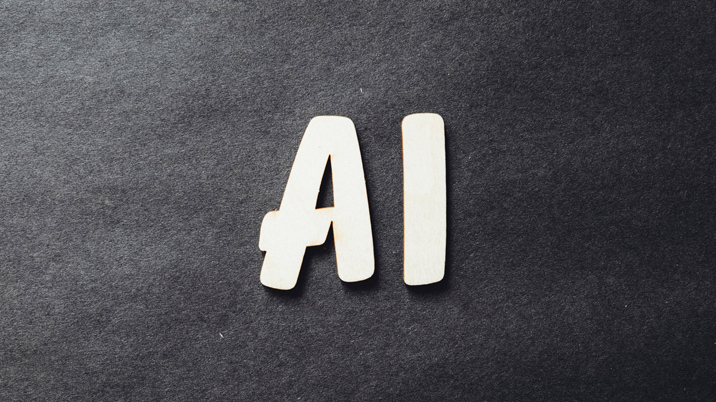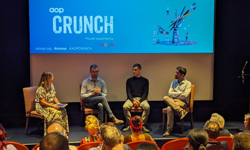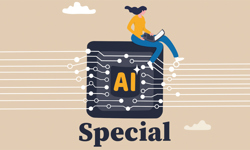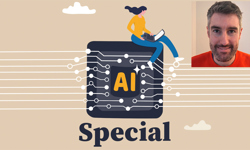
Yes, I’m afraid you’ve managed to find your way into yet another column devoted to the ubiquitous topic of artificial intelligence. Of course, given the headline, it wouldn’t take a MENSA IQ to figure that out for yourself. But that assumes that you’re part of the backward group still stubbornly trying to use your own brain, rather than an AI chatbot, to get through the day.
But seriously… We all know that articles about AI are inescapable for good reason. Those who appear to be experts say it will affect nearly every aspect of our lives. And many believe that publishing is among the businesses facing a potential existential threat.
For context, let’s not forget that publishers have been fighting for their lives against the tech giants since the internet began disrupting everything at the end of the 1990s. In retrospect, publishers blew it by initially going with a free-content, totally ad-supported internet model, and were ultimately devastated by the reach of search and social media. Amazingly, even as print and the business model it was based on were being inexorably eroded, some legacy publishers managed to survive huge revenue losses and years of costly trial-and-error to build more viable digital models, heavily supplemented with other new revenue streams. But let’s face it: The battle very much continues.
And now comes generative AI, courtesy of OpenAI’s ChatGPT, Google’s Bard, Microsoft’s relaunched Bing (incorporating the controversial latest GPT-4 technology), and others.
Which will absolutely destroy publishing. Or maybe just propel further, painful, evolution.
In the ongoing battle to carve out some digital revenue share, some publishers have built successful ecommerce and streaming video channels, and with tracking cookies on their way out, a growing number are attracting advertising through first-party data-driven contextual platforms. Paywalls have become commonplace, but with few exceptions, are not big money makers. (Time, which still has 1.3 million print subscribers to just 250,000 digital subs, is dropping its paywall, claiming a desire to reach more young consumers globally through online and mobile.) Some publishers, including Condé Nast, Hearst and Dotdash Meredith, have forged what appear to be mutually beneficial promotional / content deals with platforms like Instagram and Pinterest. Some continue to sell limited numbers of subscriptions via Apple News+, remaining wary of giving Apple a 15% commission and control of the customer relationship.
And yes, of course, publishers benefit from search- and social-generated traffic, up to a point. A recent five-year analysis of 546 US and UK news sites found an average of 35%, but some get half or more of their traffic from search. Still, publishers argue, with a good deal of validity, that they’ve yielded relatively little in return for allowing Google, Facebook and other social media to use their expensively produced content to reinforce the platforms’ status as dominant information gateways that also suck up most available digital ad revenue. The current model clearly does not adequately support serious journalism (witness the recent demise of BuzzFeed News, as well as the ongoing devastation of local US newspapers), and AI could well result in further reducing that revenue. For starters, while the AI players insist that they want to support a healthy journalism ecosystem, and perhaps even pay for using content, AI chatbots and search results, unlike articles appearing in traditional search and social platforms, at this stage don’t necessarily include the links to the original sources that generate subs and support publishers’ advertising.
Generative AI: Taking the Battle To A New Level
Generative AI is already intertwined with, and raising the stakes for, the ongoing battle between publishers – aka “content providers” – and the digital titans.
That battle includes fighting for payments tied directly to content use and trying to break Google’s stranglehold on search advertising. After very grudgingly acceding to paying Australian publishers for content, Facebook / Instagram parent Meta is furiously fighting similar legislation in Canada and the US (both still pending at this writing) – in part by declaring how little publishers’ content matters to its users or its bottom line, and threatening to hurt publishers by dropping such content entirely. (Meta’s own commissioned study estimated that publishers derive perhaps 1% to 1.5% of their total revenue from Facebook traffic.) The US pay-for-content legislation, the Journalism Competition and Preservation Act (JCPA), includes payment negotiation provisions that would take into account revenue generated by “crawling” a publisher’s online content for AI purposes.
Meanwhile, Google is fighting antitrust actions on the digital advertising front, even though it’s acknowledged that more competition between its ad exchange and publishers using header bidding would potentially increase publisher revenues by 30% to 40%. The good news: In April, a US court refused to dismiss the Justice Department’s suit charging Google with “corrupting legitimate competition” in the ad-tech industry.
Some publishers – including Trusted Media Brands / TMB and Forbes – have formed internal task forces to assess AI’s likely effects and try to minimise the negative ones and optimise beneficial applications. And at least one, News Corp, has acknowledged that it’s already trying to negotiate individual agreements with AI developers.
Other groups are moving to try to constructively intervene to establish guardrails. The News Media Alliance, which represents 2,000 media outlets around the world, is developing principles to guide development and use of AI systems and regulations that would protect publishers. The draft calls for requiring tech companies to negotiate agreements and explicit permission from publishers and provide “sufficient value” for trustworthy content. It also states that any new laws that make exceptions to copyright law for AI must not weaken publishers’ copyright protections, according to The New York Times. “Without these protections, publishers – far too many of whom already struggle to survive in the online ecosystem due to marketplace imbalances – face an existential crisis that threatens our communities’ access to reliable and trustworthy journalism,” says the document.
Then there’s the UK’s own Association of Online Publishers, which is working to establish guidelines to prevent ethics-challenged advertisers from misusing publisher-site access privileges that were meant for verifying contextual ad placements. Some advertisers are instead using AI crawling to collect publisher metadata and content to build their own contextual audience segments for commercial gain – behaviour that could threaten publishers’ increasingly valuable first-party data assets.
On the more aggressive front, Barry Diller, chairman of IAB – owner of Dotdash Meredith and many other websites – has been a particularly vocal proponent of the apocalyptic view, warning that the publishing business could be extinguished if “all the world’s information is able to be sucked up in this maw and then essentially repackaged”. Publishers waited far too long to move from free to paid online content models, and they’re now in danger of making a similarly disastrous mistake, he argues. While he concurs that the first approach should be regulatory, he is also working behind the scenes with publishers to organise a potential legal challenge based on violation of publisher copyrights. Such a case, which he asserts is legally sound, would end up in the Supreme Court, establishing guidelines for how large-language models can use publisher content, Diller believes.
Where is the threat greatest?
On the other hand, Jay Penske, founder / CEO of Penske Media – the markedly successful multichannel media company originally built on legacy brands like Variety and The Hollywood Reporter – recently told CNBC that while he thinks that publishers / media probably need to form some kind of collective to develop a thoughtful response to AI, he views AI as a threat mainly to publishers that offer straight reporting of information easily accessible from many sources, as opposed to the “investigative” reporting and expert opinion that take some content, including his own brands’, to the next level.
That made me wonder if Diller’s passionate stance on AI has to do at least in part with his understanding that lots of the content on IAB-owned sites, including those under Dotdash Meredith – which sells contextual advertising in free, originally produced, vertical special interest and DIY content – is the kind of largely neutral, information-heavy, evergreen content that is particularly vulnerable to being devoured by chatbots. But News Corp chairman Rupert Murdoch has indicated willingness to use legal remedies, should private negotiations prove inadequate to protect News Corp’s content – which is hardly DIY, ranging from tabloid crap to The Wall Street Journal. That would seem to indicate that Rupert (along with many others), views AI as having an omnivorous appetite.
Publishing researcher Toolkits’ Subscriptions Snapshot for Q2 2023 concludes that it now appears that AI is “likely to meaningfully disrupt the relationship between publishers and their audiences, particularly as it relates to content-based subscription products.” The report notes that these are based on content exclusivity, and if AI is able to access and expand on that content, “convincing audiences to pay publishers directly could become more challenging.” It adds that “it remains unclear if and how AI tools are currently reaching beyond paywalls to gain access to subscriber-only content, but concerns are mounting. A growing number of publishers now believe their paywalled information is showing up directly in responses generated by AI tools, and are demanding greater clarity from Google, Microsoft, OpenAI, etc.”
In addition to potentially devasting damage to search-driven advertising and subscription revenue, and publishing staffs’ demoralisation due to concerns that AI may replace at least some of their jobs, some publishers are anxious that AI could affect their affiliate businesses. Condé Nast, Hearst, Dotdash Meredith, Future plc and others have built out their product-recommendation divisions, which generate revenue when users click into an affiliate link and make a purchase. Although their sites’ expertise will likely protect them to a large degree, AI-driven search could increase competition by reducing the surface area of search-results pages and creating demand for a new type of SEO expertise, experts told Adweek.
However, it’s not 100% doom-and-gloom. As usual, some publishers are viewing the scenario from the glass-half-full standpoint. Rather than fretting about search damage, some publishers are working on using AI to support their SEO efforts. TMB’s new AI task force, comprising managers from business development, editorial, sales and marketing, is gathering input that has already resulted in a few “min-size” AI projects, CTO Nick Contardo told Digiday. “Our approach isn’t going to be to take things like AI or ML and replace employees,” he said. Instead, the focus is to streamline some operations and see if the technology can help the company improve performance in areas like optimising headlines and keywords for search and surfacing on-target content to readers.
While publishers would indeed be foolish not to push hard now to ensure that rules and means of reasonable financial reciprocation are established at this still-early stage, they would also be remiss not to engage in low-risk, low-cost exploration of its potential applications.
“I would absolutely recommend that you experiment with it,” but “I would suggest you do not write cheques to buy tools and programs until you’ve been through a process of thinking through what problem it solves,” Charlie Beckett, director of Polis at the London School of Economics, told The International News Media Association (INMA). “Does it do it any better than what you had before? Do you understand how it works?” Beckett also urges publishers not to risk the quality of editorial by using still-unreliable AI for actual published content. Amen to that. And kudos to Condé’s Wired, which has released an official policy stating that, at least for now, it will use AI only for generating possible ideas for stories, headlines and social media posts, not for writing or editing.
AI could help improve publishing efficiency and reduce the drudgery of low-level tasks for journalists and other media employees, Rafat Ali, founder of travel industry platform Skift, noted on FIPP’s website. But the bigger point is that publishers need to be optimists in the Age of AI for two simple reasons: its existence is beyond their control, and “if you’re a pessimist, you’re dead”.
This article was first published in InPublishing magazine. If you would like to be added to the free mailing list to receive the magazine, please register here.










